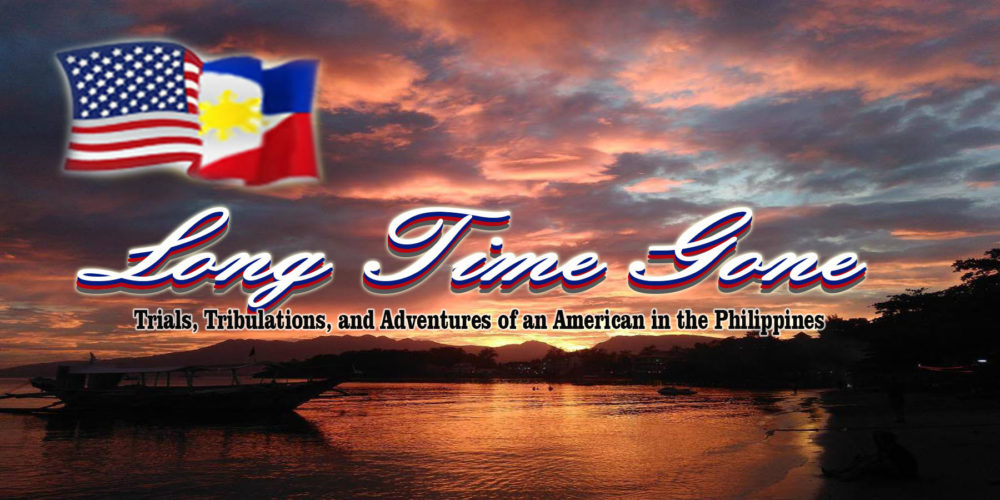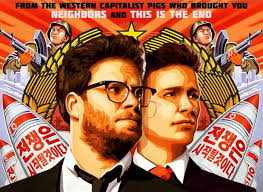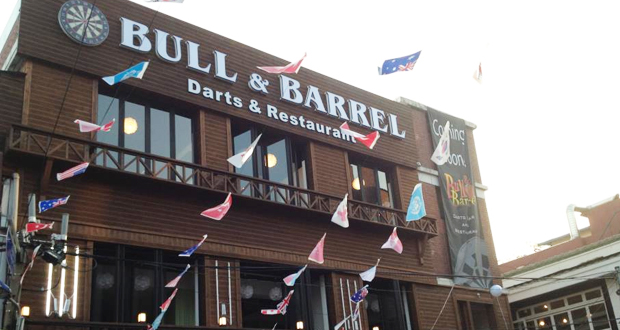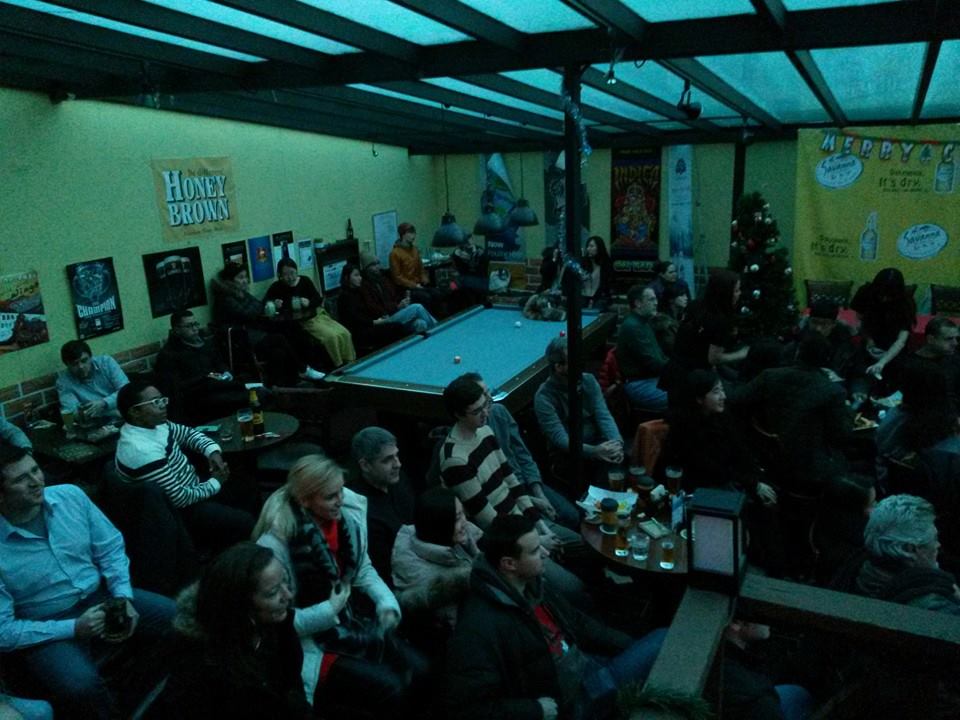I’ve only seen “The Interview” once and I have no immediate plans to see it again, so I’m not technically reviewing the film. *ahem*
However, lots of other folks have put forth the time and effort to do a proper review of the movie. I’ll share the best of those and add a few thoughts of my own along the way.
As I made my morning rounds of the internets I found this gem of a review from James Taranto at The Wall Street Journal entitled “Escape from You Nork” (if the link doesn’t get you past the WSJ paywall, just do a Google search of the title). It starts with one of those “Un” puns that may make Kevin Kim’s head explode. Regardless, it’s a worthwhile read, not so much as a review of the film but as a review of some reviews of the film. Plus, a little inside baseball on the controversies surrounding its release.
Speaking of Kevin Kim, almost immediately after reading Taranto’s piece, I came upon his excellent review on his Hairy Chasms blog. I pretty much share his overall impressions and conclusion, upon which I will elaborate later in this post. Definitely go give it a read.
Kevin helpfully shared the third review I read this morning, from Barbara Demick in The New Yorker. Ms. Demick is a noted authority on the madness that is the DPRK and I found myself nodding in agreement with her points throughout the review. I think you’ll enjoy it too.
Now, the circumstances of my seeing “The Interview” may be of some interest. I happened to show up at Bull and Barrel for an impromptu game of darts.
Whilst there I made the acquaintance of a guy named Philip Iglauer who I later learned is a journalist who writes for The Diplomat. He wasn’t there for the darts however, instead he was making final arrangements for a New Year’s Day showing of “The Interview” to be followed by a panel discussion. I scored an invite and showed up at the appointed time.

The screen was bigger than most I suppose. You can even see the back of the ol’ Walrus’ head in the right rear corner of this photo…
I enjoyed the movie for what it was and was not put off by what it wasn’t (and frankly, what it wasn’t was not what it intended to be). It was a Seth Rogen lightweight/low brow comedy farce for crissakes. I really grow weary of the overly-sensitive types who take offense at every perceived slight or unflattering stereotype. When did we lose the ability to laugh at ourselves? Anyway, I found the film moderately funny, but not as funny or scathing as Team America: World Police (one of my all-time favorites).
My political philosophy summed up in two minutes. Does that make me a dick, pussy, or asshole? You decide.
But back to the movie at hand. After our viewing at BnB (I estimate the audience was maybe 20% Korean), the panel discussion ensued.

The panel: (Left to Right):
Lee Han-byeol is North Korean defector. She is also a Korean Unification master’s student at Yonsei University and Chief of Administration at “Justice For North Korea.”
Park Sokeel is Director of Research & Strategy for Liberty in North Korea, an international NGO that works with North Korean refugees.
Nemo Kim is a film critic & journalist specializing in Asian cinema. Currently the Korea correspondent for Variety, she writes for Sight & Sound and teaches Korean cinema and Korean Wave classes at the Hanguk University of Foreign Studies.
Peter Jung is Director & Founder of “Justice For North Korea,” a North Korean Human Rights NGO.
Kurt Achin is a Seoul-based freelance journalist with years of experience working in media.
To be honest, I was moderately disappointed with the panel, and with just a couple of exceptions I didn’t agree with much of what they had to say. Of course, Ms. Lee (the NK refugee) was so damn pretty I didn’t care what she said. What she said was in Korean anyway. The poor interpreter did her best, but Ms. Lee talked fast and at length. The gist of her comments seemed to be that she liked the film and thought people viewing it in the north would perhaps benefit from seeing the regime portrayed in a negative light.
Mr. Park saw it differently. He thought the film didn’t go far enough in showing the abuses taking place and indicated the comedic approach was somehow counterproductive. He also said that he thought balooning the film into the North was a mistake as it would damage the possibility of improved relations between the countries.
Ms. Kim came off as the snooty Brit she was raised to be. She made note of the fact that she was an actual movie reviewer for Variety (as if that made her opinions more valuable). She was the one who took the most offense at the “stereotypical” depictions of Asians. She also faulted the film for being “unrealistic”, noting that the real Kim Jong-Un spoke near perfect English. She also didn’t like the fake grocery store, saying that such stores do not in fact exist in Pyongyang. Whatever was my response.
Mr. Jung did not like the movie much either. He thought it fed into the ugly American stereotype that is ingrained into the North Korean citizenry. He didn’t think the criticisms of the regime would set well with the general populace up north. That might be a valid point, considering how the average American reacts to criticisms coming from foreigners.
Mr. Achin was the only American on the panel and he’s the one who seemed to make the most sense. He dismissed the minor discrepancies as a natural “comedic license” and noted that the film did not shy away from pointing out the most egregious human rights violations perpetuated by the past and present Kim regimes. He also mentioned that the stereotypes cut both ways, with the “dumb American” mindset on prominent display throughout the movie.
The microphone never got around to me before I lost patience with the whole endeavor. Had it reached me, this is what I would have tried to say:
It’s only a movie, a non-serious one at that. It was never intended to be used as a propaganda piece to win the hearts and minds of the North Korean populace. What it does accomplish though is to get people thinking and talking about what is happening in a country that most Americans never seriously consider. That’s a good thing. And the fact that the Kim regime went to extraordinary lengths to try and keep this film from being viewed says a lot. If nothing else, it provided us all an excellent opportunity to offer Mr. Kim Jong-un a heartfelt “fuck you very much” just by watching.
Isn’t that enough?




Great survey. Most “meta,” indeed. I think we’re mostly on the same page, you and I, but some of those panelists sound positively goofy.
you missed your calling john. siskel and mccrarey or mccrarey and ebert. either one has a nice ring to it.